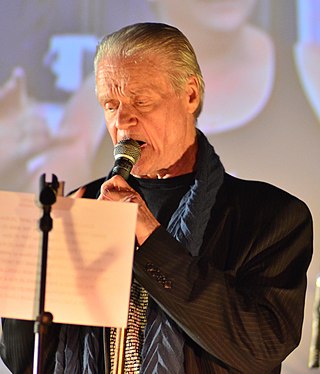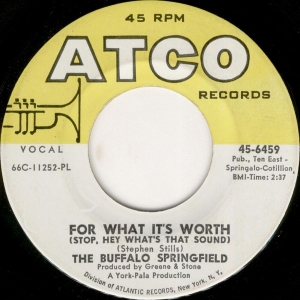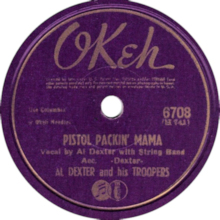
Capitol Records, LLC, and simply known as Capitol, is an American record label owned by Universal Music Group through its Capitol Music Group imprint. It was founded as the first West Coast-based record label of note in the United States in 1942 by Johnny Mercer, Buddy DeSylva, and Glenn E. Wallichs. Capitol was acquired by British music conglomerate EMI as its North American subsidiary in 1955. EMI was acquired by Universal Music Group in 2012, and was merged with the company a year later, making Capitol and the Capitol Music Group both distributed by UMG. The label's circular headquarters building is a recognized landmark of Hollywood, California.

MCA Records was an American record label owned by MCA Inc. established in 1972, though MCA had released recordings under that name in the UK from the 1960s. The label achieved success in the 1970s through the 1980s, often by acquiring other record labels, from ABC to Motown to Geffen. MCA Inc. became Universal Studios, Inc., in 1996, and the MCA record label was folded into Universal Music Group's Geffen Records in 2003, but Universal's MCA Nashville continues to use the moniker.
The Grammy Award for Best Rock Instrumental Performance was an honor presented to recording artists for quality instrumental rock performances at the Grammy Awards, a ceremony that was established in 1958 and originally called the Gramophone Awards. Honors in several categories are presented at the ceremony annually by the National Academy of Recording Arts and Sciences of the United States to "honor artistic achievement, technical proficiency and overall excellence in the recording industry, without regard to album sales or chart position".

Astralwerks is an American record label primarily focused on electronic music that is now owned by Universal Music Group. Its material is distributed via Capitol Music Group in the United States. The label was founded in 1993 and, in its early years, featured prominent British acts like The Future Sound of London, Fatboy Slim and The Chemical Brothers. In recent years, its roster has expanded to include acts like Halsey, Marshmello, Porter Robinson, Illenium, Zhu and numerous others. In 2018, Astralwerks' headquarters were moved from its original home of New York City to Los Angeles.

Kim Vincent Fowley was an American record producer, songwriter and musician who was behind a string of novelty and cult pop rock singles in the 1960s, and managed the Runaways in the 1970s. He has been described as "one of the most colorful characters in the annals of rock & roll", as well as "a shadowy cult figure well outside the margins of the mainstream".

Hollywood Boulevard is a major east–west street in Los Angeles, California. It runs through the Hollywood, East Hollywood, Little Armenia, Thai Town, and Los Feliz districts. Its western terminus is at Sunset Plaza Drive in the Hollywood Hills and its eastern terminus is at Sunset Boulevard in Los Feliz. Hollywood Boulevard is famous for running through the tourist areas in central Hollywood, including attractions such as the Hollywood Walk of Fame and the Ovation Hollywood shopping and entertainment complex.

"For What It's Worth " is a song written by Stephen Stills. Performed by Buffalo Springfield, it was recorded on December 5, 1966, released as a single on Atco Records in December 1966 and peaked at No. 7 on the Billboard Hot 100 chart in the spring of 1967. Its association with the Vietnam War is a popular misconception; the song is about young people clashing with police during the counterculture era.
Tower Records is an international retail franchise and online music store that was formerly based in Sacramento, California, United States. From 1960 until 2006, Tower operated retail stores in the United States, which closed when Tower Records filed for bankruptcy and liquidation. Tower Records was purchased by a separate entity and was not affected by the retail store closings.

"Missing You" is a song by American singers Brandy, Gladys Knight, Chaka Khan and Canadian R&B musician Tamia. The song was used to promote the 1996 film Set It Off. It was written and produced by Gordon Chambers and Barry J. Eastmond and released as the lead single from the soundtrack album of the film on August 6, 1996, through East West Records. The song features a string arrangement conducted by Eastmond.

Adelaide Gail Zappa was the wife of musician and composer Frank Zappa and the trustee of the Zappa Family Trust. They met in Los Angeles in 1966 and married while she was pregnant with their first child, Moon, followed by Dweezil, Ahmet and Diva. Gail was also the aunt of model and actress Lala Sloatman.

The 1987 MTV Video Music Awards aired live on September 11, 1987, from the Universal Amphitheatre in Los Angeles. Hosted by MTV VJs Downtown Julie Brown, Carolyne Heldman, Kevin Seal, Michael Tomioka, and Dweezil Zappa, the show honored the best music videos released from May 2, 1986, to May 1, 1987.

The Capitol Records Building, also known as the Capitol Records Tower, is a 13-story tower building in the Hollywood neighborhood of Los Angeles, California, United States. Designed by Louis Naidorf of Welton Becket Associates, it is one of the city's landmarks, and is listed on the National Register of Historic Places. Construction began soon after British music company EMI acquired Capitol Records in 1955, and was completed in April 1956. Located just north of the Hollywood and Vine intersection, the Capitol Records Tower houses the consolidation of Capitol Records' West Coast operations and is home to the recording studios and echo chambers of Capitol Studios. The building is a Los Angeles Historic-Cultural Monument and sits in the Hollywood Boulevard Commercial and Entertainment District. It has been described as the "world's first circular office building."
I.R.S. Records Presents: The Cutting Edge, also known as The Cutting Edge or IRS's The Cutting Edge, is a music program that aired on MTV from March 1983 to September 1987, on the last Sunday of every month. The show was retitled The Cutting Edge Happy Hour in 1987.

"Pistol Packin' Mama" was a "Hillbilly"-Honky Tonk record released at the height of World War II that became a nationwide sensation, and the first "Country" song to top the Billboard popular music chart. It was written by Al Dexter of Troup, Texas, who recorded it in Los Angeles, California on March 20, 1942, with top session musicians Dick Roberts, Johnny Bond and Dick Reinhart, who all normally worked for Gene Autry. It was used in the 1943 film Pistol Packin' Mama, starring Ruth Terry and Robert Livingston.

"Here We Go Again" is a country music standard written by Don Lanier and Red Steagall that first became notable as a rhythm and blues single by Ray Charles from his 1967 album Ray Charles Invites You to Listen. It was produced by Joe Adams for ABC Records/Tangerine Records. To date, this version of the song has been the biggest commercial success, spending twelve consecutive weeks on the US Billboard Hot 100 chart, peaking at number 15.
Leland James Gillette, known professionally as Lee Gillette, was an American A&R director, record producer and musician.
Peter Doell is an American recording and mastering engineer known for his work with Miles Davis, Toto, Céline Dion and The Beach Boys. Doell has been a staff engineer at Capitol Studios, Sunset Sound Recorders and Universal Mastering Studios West. His film and TV work includes Road To Perdition, Black Hawk Down and Monsters, Inc., American Idol, The Voice and Empire.
Sylvia St. James is an American gospel and soul singer, recording artist, and entertainment host. She is best known for her time as the Mistress of Ceremonies of the House of Blues Sunday Gospel Brunch, and her appearances in her signature long, white embroidered dress with a wide, feathered hat.











